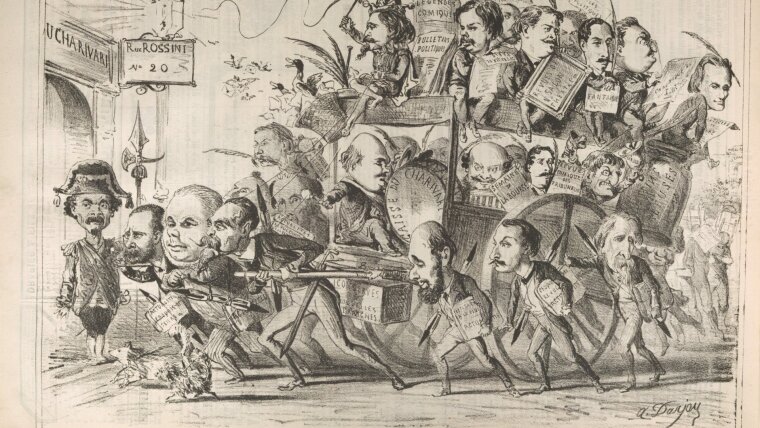
Published:
-
Deadline for submitting Abstracts
-
20—21 November 202520—21 November 2025Workshop
Figures, Types, and Images of the Social in the 19th and 20th Century: Practices of Social Imagining in the History of Knowledge and the Sciences
“It is no easy matter […] to arrange the several varieties of work into ‘orders’, and to group the
manifold species of arts under few comprehensive genera, so that the mind may grasp the
whole at one effort – it is a task of most perplexing character”, Henry Mayhew wrote in his
London Labor and the London poor (1849–1851). Mayhew’s early London social research is
well known, while it is less well known that he lived in Paris at the end of the 1830s, when the
new medium of illustrated journals and collective publications was at its peak, bringing
together images and texts, artistic-literary and (popular) scientific circles in a new, creative
way. Back in London, Mayhew also worked between journalism and social statistics and
deliberately drew on pictorial representations of social types for the latter, shaping
imaginations of the social.
Mayhew’s case refers to processes of shaping, naturalization, and essentialization between
literary-artistic and scientific typification, visible on the one hand in Honoré Daumier’s or
Honoré de Balzac’s social caricature, and on the other in Quetelet’s “average man”, Weber’s
“ideal type”, Durkheim’s “collective representations”, and Kracauer’s “employees”, to
Castoriadis’ abstract of a “soi-mêmes” of society. This is the starting point for our
interdisciplinary workshop, which is interested in the intertwined histories of concrete images
of the social, social types, and social figures and of practices of social imagining in-between
individual and society, and in literature, art, and the sciences. Specifically, the workshop asks
how social ideas took shape in the early 19th century by means of visual techniques of
observation, modeling, and representation, for example in drawings and daguerreotypes,
maps, tables, and diagrams, in the medium of journals, novels, social reportages or scientific
treatises. We also ask how this influenced the formation of concepts and theories in the
humanities, cultural studies, and social sciences in the broad context of the so-called social
imaginary. We are interested in but not limited to cultural and literary studies / the history of
knowledge / historical-epistemological perspectives that pursue microstudies of individual
figures, types, and images of the social with a special interest in visual culture / visual studies
/ art history; in addition, in diachronic studies that show the connections between concrete
images and abstract imaginations; also in epistemic practices and instruments in the context
of sketchbook, protocol, brush, and paint, camera, drawing instrument or measuring
instrument; or in biographical approaches and / or personal entanglements.
We look forward to abstracts (max. 400 words, in pdf format) with proposals for approx. 25-
minute presentations together with a short CV by May 2, 2025, to
adriana.markantonatos@uni-jena.de . The presentations will be in English, the discussions
bilingual English/German. The workshop will take place in Erfurt. Travel and accommodation
costs will be covered by the organizers.
The workshop is a cooperation of the junior research group “Imagination as a Cultural
Technique. Drawing Practices and Dynamics of Social Imagining in Modern Illustrated Print
Media” at Friedrich Schiller University Jena (Maxim Braun, Jasmin Köhler, Adriana
Markantonatos), the Chair of Cultural History at Friedrich Schiller University Jena (Anja
Laukötter), and the Chair of History of Science at the University of Erfurt (Bernhard Kleeberg).
It is part of the Cluster of Excellence initiative “Imaginamics. Practices and Dynamics of Social
Imagining” at Friedrich Schiller University Jena (together with the Universities of Erfurt, Halle,
and Weimar)